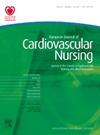Determining what matters most to Marfan syndrome (MFS) patients: a convergent mixed method study of the health-related quality of life and psychosocial effects of MFS aortovascular manifestations
IF 2.9
3区 医学
Q2 CARDIAC & CARDIOVASCULAR SYSTEMS
引用次数: 0
Abstract
Background Marfan Syndrome (MFS) affects multiple organ systems but the aortovascular manifestations are the most serious and life-threatening. However, there is no available evidence on the effect of the aortovascular manifestations on health-related quality of life (HRQoL) and psychosocial wellbeing of MFS patients. Purpose This study aims to determine the HRQoL and the psychosocial effects of the aortovascular manifestation of MFS. Methods A convergent mixed-method design was used in this single site study. Specifically, the quantitative study (S1) is an observational exploratory study using seven validated questionnaires relating to HRQoL (SF36, EQ-5D-5L) and psychosocial health (depression [CESD], illness perception [IPQ], fatigue [FSS], self-esteem [RSES], stigma [PSQ]), previously used in MFS research. The qualitative study (S2) is an exploratory study using semi-structured interviews. Analysis consisted of descriptive and inferential statistics and Framework method1 for S1 and S2, respectively. Joint display was used for data integration. Results A total of 75 participants completed the questionnaires (S1) and 20 were interviewed (S2). The mean age was 43 years (S1) and 40 years (S2) and the majority (S1: 54 (72%); S2: 17 (85%)) were white British. S1 found the majority of MFS participants experienced depression, anxiety, pain and fatigue. These areas were confirmed in S2. A positive self-esteem was generally reported in S1, but this is not supported by S2, which highlighted patients experience a loss of self-esteem due to perceived body image disturbance. Finally, S2 generated new areas not identified in S1 including health anxiety, loss of personal efficacy, self-stigma and ‘invisible disability’ affecting work and socio-economic condition. Overall, the joint display generated three confirmed, seven expanded and one discordant finding. Conclusion MFS patients with aortovascular manifestations experienced several HRQoL and psychosocial issues related to their condition. Collaborative efforts are needed to develop multifaceted interventions and programs to address their needs and provide a holistic and comprehensive service for MFS patients. Finally, four new areas were identified in S2, which added important new evidence in this body of knowledge.确定马凡氏综合征(MFS)患者最关心的问题:关于马凡氏综合征主动脉血管表现的健康相关生活质量和社会心理影响的聚合混合方法研究
背景 马凡综合征(MFS)影响多个器官系统,但以主动脉血管表现最为严重并危及生命。然而,目前尚无证据表明主动脉血管表现对马凡综合征患者健康相关生活质量(HRQoL)和社会心理健康的影响。目的 本研究旨在确定 MFS 主动脉血管表现的 HRQoL 和社会心理影响。方法 在这项单点研究中采用了融合混合方法设计。具体来说,定量研究(S1)是一项观察性探索研究,使用了七种与 HRQoL(SF36、EQ-5D-5L)和心理社会健康(抑郁[CESD]、疾病感知[IPQ]、疲劳[FSS]、自尊[RSES]、耻辱[PSQ])有关的有效问卷,这些问卷以前曾在 MFS 研究中使用过。定性研究(S2)是一项探索性研究,采用半结构式访谈。对 S1 和 S2 的分析分别包括描述性和推论性统计以及框架法1。数据整合采用了联合显示法。结果 共有 75 人填写了问卷(S1),20 人接受了访谈(S2)。平均年龄为 43 岁(S1)和 40 岁(S2),大多数(S1:54 人(72%);S2:17 人(85%))为英国白人。S1 发现大多数 MFS 参与者都有抑郁、焦虑、疼痛和疲劳的经历。这些方面在 S2 中得到了证实。S1 中普遍报告了积极的自尊心,但 S2 并不支持这一点,S2 强调患者因认为身体形象受到干扰而丧失自尊心。最后,S2 发现了 S1 中未发现的新领域,包括健康焦虑、个人效能感丧失、自我耻辱感以及影响工作和社会经济状况的 "隐形残疾"。总之,联合展示产生了 3 项确认结果、7 项扩展结果和 1 项不一致结果。结论 有主动脉血管表现的 MFS 患者经历了与其病情相关的多个 HRQoL 和社会心理问题。我们需要共同努力,制定多方面的干预措施和计划来满足他们的需求,并为 MFS 患者提供全面综合的服务。最后,S2 确定了四个新领域,为这一知识体系增添了重要的新证据。
本文章由计算机程序翻译,如有差异,请以英文原文为准。
求助全文
约1分钟内获得全文
求助全文
来源期刊

European Journal of Cardiovascular Nursing
CARDIAC & CARDIOVASCULAR SYSTEMS-NURSING
CiteScore
5.10
自引率
10.30%
发文量
247
审稿时长
6-12 weeks
期刊介绍:
The peer-reviewed journal of the European Society of Cardiology’s Council on Cardiovascular Nursing and Allied Professions (CCNAP) covering the broad field of cardiovascular nursing including chronic and acute care, cardiac rehabilitation, primary and secondary prevention, heart failure, acute coronary syndromes, interventional cardiology, cardiac care, and vascular nursing.
 求助内容:
求助内容: 应助结果提醒方式:
应助结果提醒方式:


